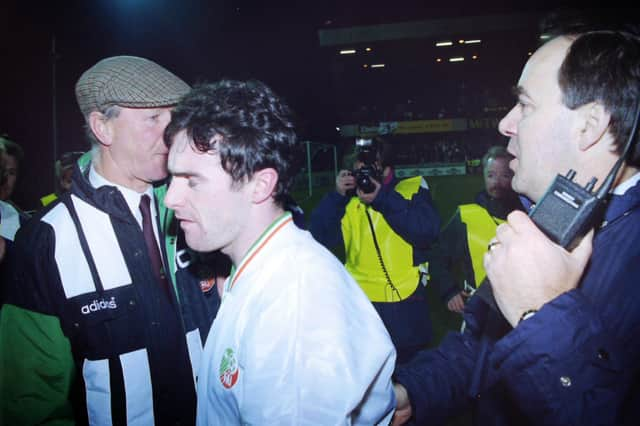What really happened at Windsor Park that ‘night in November’ 1993?


• See link below for main story
The World Cup qualifier between Northern Ireland and the Republic has gone down in history as one of the worst displays of sectarian bigotry ever witnessed at a sporting event, however, I have delved into the archives to establish why the subsequent reports are at odds with my own very different experience of the match and its aftermath.
I uncovered a shocking contrast between what has become the accepted narrative, perpetuated by countless political commentators and pundits, with what was actually reported at the time by those who were there.
Advertisement
Hide AdAdvertisement
Hide AdContrary to the folklore that sprang from the first misinformed reports of a few columnists, the Northern Ireland fans were widely praised for their behaviour when the potentially problematic fixture passed without incident.
First hand accounts of the midweek 1-1 draw in all three of Northern Ireland’s daily newspapers reported a trouble-free match with no mention at all of sectarianism.
On the Thursday morning, an Irish News report celebrating the Republic’s qualification for the World Cup finals concluded: “In Belfast, the police praised the behaviour of fans at the game. Sports Minister Michael Ancram said the fans’ sporting behaviour had been an example to the rest of the footballing world’”.
In the Belfast Telegraph, Irish President Mary Robinson is quoted as saying the game had “been a triumph for sport on this island”.
• See link below for main story
Advertisement
Hide AdAdvertisement
Hide AdThe only major talking point was a well-documented pre-match spat between managers Billy Bingham and Jack Charlton that continued during the game and immediately afterwards.
In a subsequent interview, Republic manager Charlton would complain that Northern Ireland “tried too hard” having clearly expected Bingham’s team to roll over in what was the legendary Northern Ireland manager’s last game in charge of the national side.
By the weekend, sectarian, and even Nazi-like racial supremacy, motivators had been attached to Northern Ireland’s will to win, with one Dublin newspaper saying the Northern Ireland team had been “swept forward in a loyalist rage.”
In the Dail, Fine Gael TD Austin Deasy said Billy Bingham should be indicted for “inciting national hatred”.
Advertisement
Hide AdAdvertisement
Hide AdPlaywright Marie Jones, shocked by what she read in the Sunday papers, began developing the idea for ‘A Night in November’ - the fictional tale of a NI fan so sickened by the sectarian bigotry that he switches allegiance to the Republic.
An academic study carried out in 1996 (Unionism in modern Ireland) reported: “Following the Belfast match, the reaction in some quarters seemed to border on the hysterical.”
• See Wednesday’s News Letter for the full in-depth report
——— ———
A message from the Editor:
Thank you for reading this story on our website. While I have your attention, I also have an important request to make of you.
Advertisement
Hide AdAdvertisement
Hide AdWith the coronavirus lockdowns having had a major impact on many of our advertisers — and consequently the revenue we receive — we are more reliant than ever on you taking out a digital subscription.
Subscribe to newsletter.co.uk and enjoy unlimited access to the best Northern Ireland and UK news and information online and on our app. With a digital subscription, you can read more than 5 articles, see fewer ads, enjoy faster load times, and get access to exclusive newsletters and content.
Visit
now to sign up.
Our journalism costs money and we rely on advertising, print and digital revenues to help to support them. By supporting us, we are able to support you in providing trusted, fact-checked content for this website.
Ben Lowry, Editor